Hoist by his own petard: The story of the fall of Boris Johnson
The prime minister is paying the price for people’s perceptions of him that were once his great strength, writes John Rentoul: the idea that he is an unconventional politician who would disrupt the establishment and deliver for the people

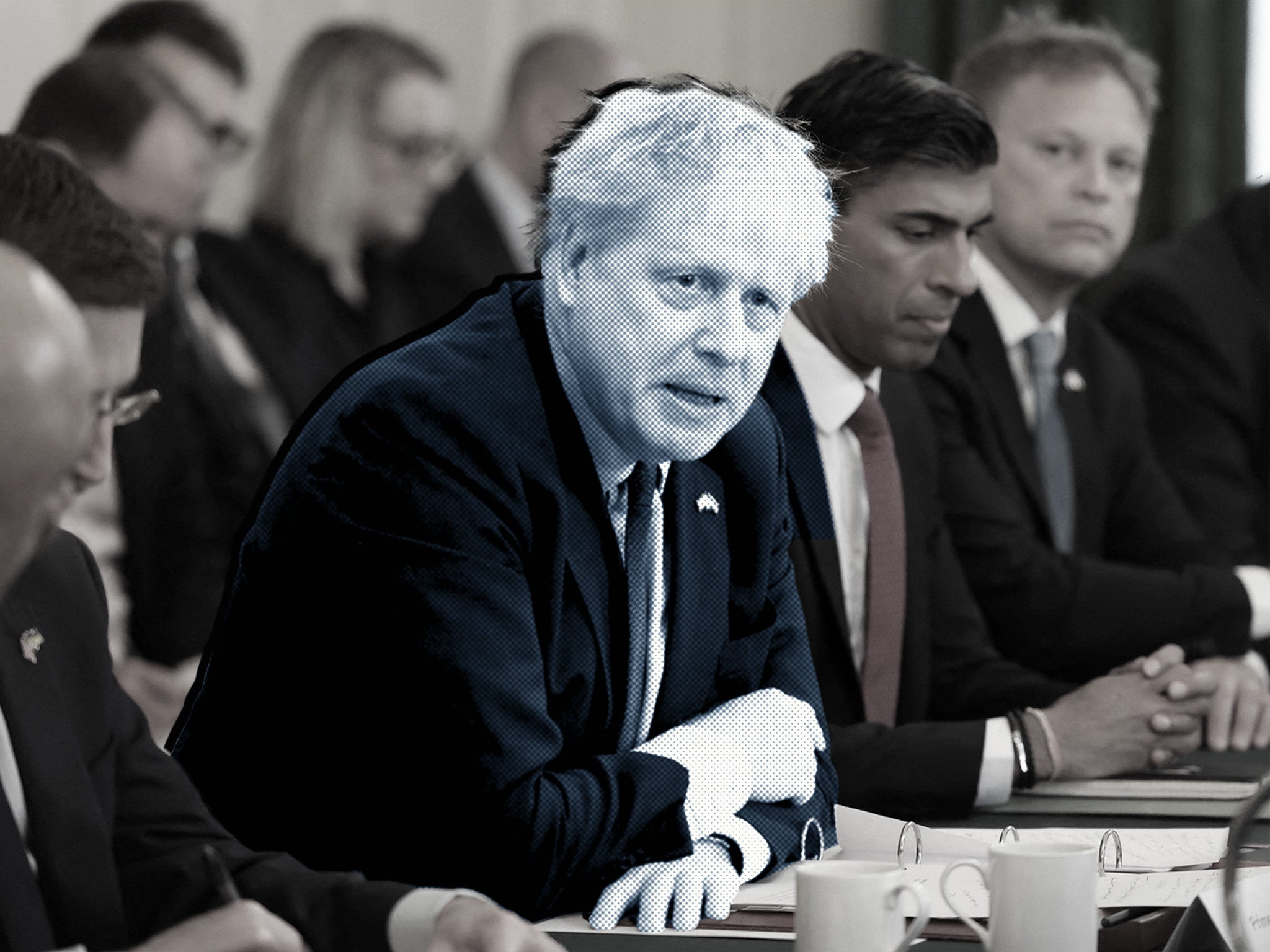
Once again I must quote Matthew Engel, the journalist who wrote in 1997: “Great electoral victories always contain the seeds of eventual defeat.” The Conservative Party turned to Boris Johnson because he was a rule-breaker who could blow open the Brexit deadlock. He succeeded in winning the party’s biggest majority since 1987 and Getting Brexit Done. But the same cavalier attitude to the rules that raised him up has also brought him down, maybe not this week – having survived a confidence vote – but one day soon enough.
The seeds of his downfall started to germinate soon after that election victory in December 2019. Just two months later, as Covid-19 spread around the world, Downing Street responded fitfully to a public health crisis. In the early days, confusion reigned and guidelines were often unclear, even to the scientific advisers and politicians who were making them.
From a lectern one metre away from Jenny Harries, the deputy medical officer, Johnson repeated government advice to observe two metres’ social distancing – to an audience of journalists in the room all sitting closer than one metre apart.
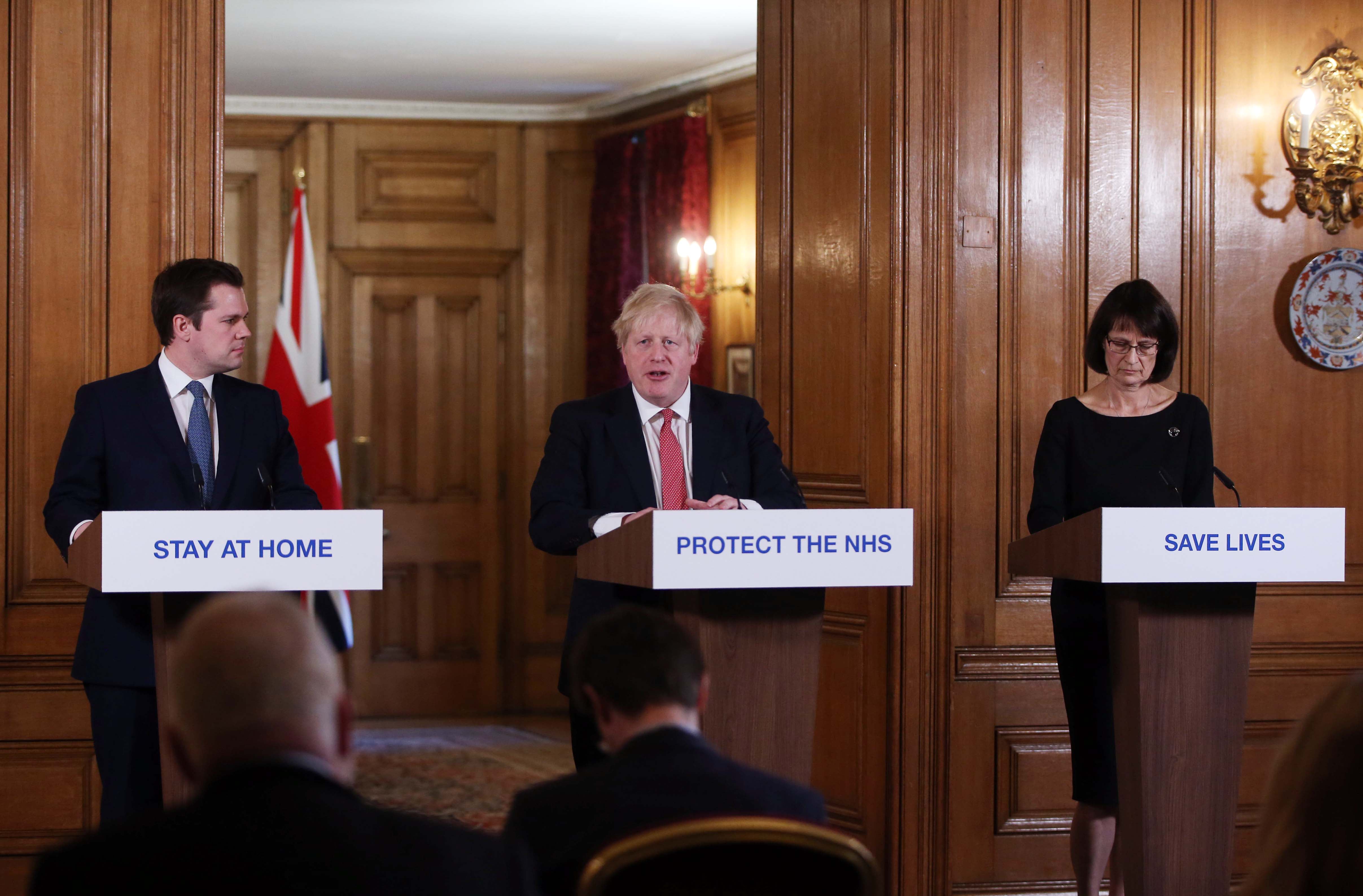
One of those journalists, Larisa Brown of the Daily Mail, asked a question: “People aren’t acting responsibly, so when are you going to get tougher and bring in the police and –” Johnson interrupted her incredulously: “Bring in the police?”
The next day, 23 March 2020, he announced a lockdown, for which retrospective legislation would be passed and which would be enforced by the police. If only, he must have reflected later, he had stuck to his initial instinct, which was that the British people could be trusted to act on government advice, without requiring a panoply of laws and heavy-handed enforcement. Often during the following two years, he would talk about relying on the common sense of the British people, and would try to rely on guidelines in preference to law, especially when lifting restrictions and when under pressure from those Conservative MPs who shared his original instincts. But by then the pass had been sold, and the machinery that would lead to him being issued – by the police – with a fixed penalty notice for breaking his own law had started to turn unstoppably.
In the early confusion, ministers understood the laws they had passed so little that they failed to notice, for example, that they had banned gatherings of more than six people for the purposes of protest. Nor was the law well understood by people working at Downing Street. There was a huge fuss in May 2020 when it was discovered that Dominic Cummings, the prime minister’s chief adviser, had driven across the country the month before to isolate with his wife and son in County Durham when he had Covid. In fact, leaving London was arguably within the law – although the Durham police decided his subsequent trip to Barnard Castle was a “minor breach”, for which they took no further action.
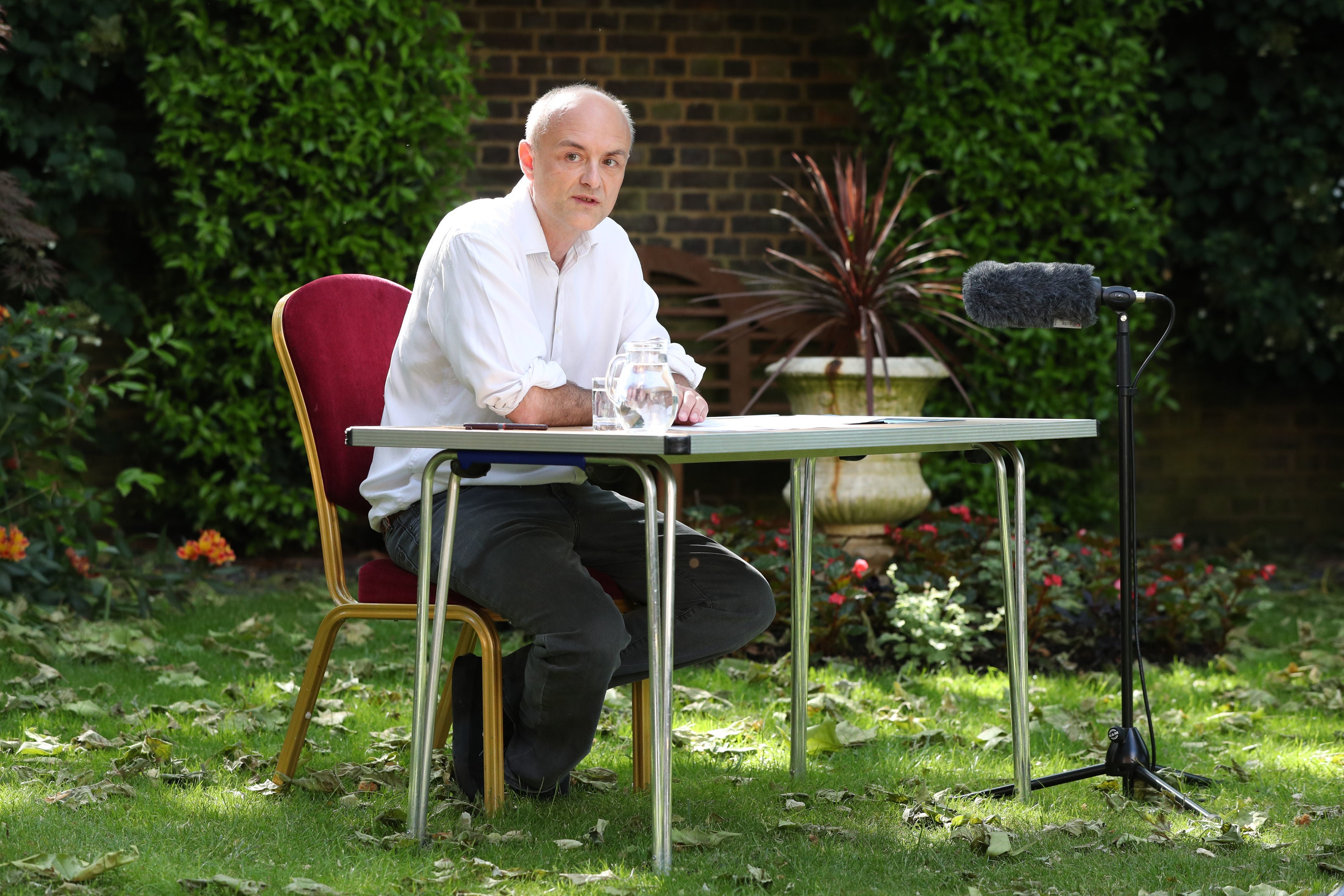
But in his statement in his defence in the Downing Street garden, Cummings said that, before he fled to Durham, he had gone home because his wife was ill, possibly with Covid – and that he had then returned to No 10 to finish his work before driving north that evening. Going back to the office was plainly in breach of the guidelines, which required people to isolate as soon as they had symptoms, but because journalists were so taken by the remarkable excuse that he had driven to Barnard Castle to test his eyesight, it attracted almost no attention.
When Cummings delivered his statement on 25 May 2020, an event had just taken place in that very garden five days earlier: an occasion to “make the most of this lovely weather”, to which the email invitation from Martin Reynolds, the prime minister’s principal private secretary, had asked staff to “bring your own booze!” The invitation referred to “socially distanced drinks”, which meant Reynolds was aware that there were restrictions on what was allowed. Some people, including Cummings and Lee Cain, his deputy, were not happy about the idea. Cain emailed Reynolds to say: “A 200-odd person invitation for drinks in the garden of no 10 is somewhat of a comms risk in the current environment.” Cain’s concern was of how the event might look if it were reported, rather than explicitly that it might be against the law, but comms – communications – was literally his job, and the reason it might look bad was because people might think it was against the law. That sense of playing fast and loose with the rules was reinforced by another message unearthed by the Sue Gray inquiry, from Reynolds to an unnamed special adviser after the event – “which we seem to have got away with”.
The way in which events unfolded to bring Johnson to the brink of doom would have been dismissed as implausible if it had been attempted in fiction
Five days after that “comms risk”, Cummings sat at one of the trestle tables that had recently been put up for drinks and party food as he answered journalists’ questions. His news conference was followed in a few weeks by another event that was later to assume greater significance. On the afternoon of Johnson’s 56th birthday, 19 June 2020, beer and sandwiches were provided in the cabinet room to celebrate the occasion in between meetings. Coronavirus cases were coming down, and restrictions had been eased, although gatherings indoors were still not permitted except for specific purposes, including work. It does not appear to have occurred to anyone that this gathering might be against the law. Indeed, journalists were told about it, and it was reported by The Times the next day. It was only much later that the plot of the story snapped back to trap not just Johnson but Rishi Sunak, the chancellor, who had arrived early for a Covid ministerial meeting and found himself singing “Happy Birthday” to the prime minister.
The way in which the mechanism unfolded to bring Johnson to the brink of doom would have been dismissed as implausible if it had been attempted in fiction. That news conference held by Cummings was the moment his relationship with Johnson broke down. That breakdown led to Cummings to seek revenge after he left No 10 six months later. After he left, carrying a cardboard box, in the middle of a new set of coronavirus restrictions during the second wave of the virus, he heard of gatherings in Downing Street that day to mark the departure of Lee Cain, his second in command, and to celebrate his own departure – gatherings that, it later occurred to him, might have broken the law.
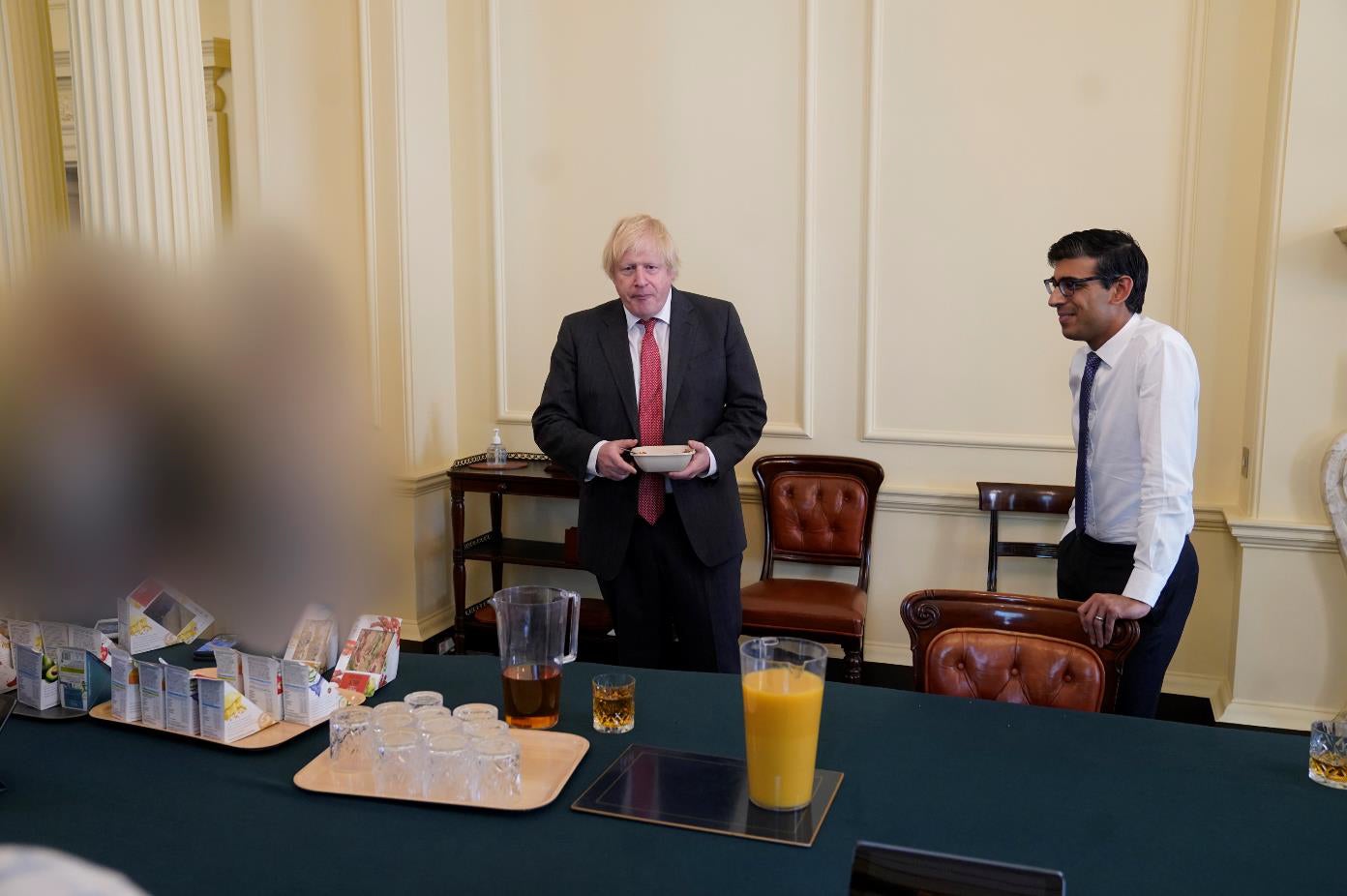
I don’t know how many of the subsequent revelations came from Cummings, but he was responsible for some of them and submitted evidence to Sue Gray, the civil servant asked to investigate later. Although it wasn’t until after Cummings had left that another party primed the mechanism that was to bring Johnson low. It was the Christmas party in the No 10 press office on 18 December 2020 that finally lit the fuse. “Between 20 and 45 individuals attended over the course of the evening to celebrate the end of year and Christmas. The event included a Secret Santa and an awards ceremony. There was alcohol and food.” Gray’s factual account of an event at a time when indoor gatherings except for work purposes were illegal is damning. Johnson wasn’t there, but word of the event seeped out – amazingly slowly, considering that it was the part of the building that interacted with journalists.
Johnson said he was shocked to discover that this sort of thing was going on in his own office. It was at this point that I think most of the British people made up their minds
It was a tribute to the discretion of the Johnson media team that, although Pippa Crerar of the Mirror had heard talk in January of a Christmas party in No 10 the previous month, it was not until a whole year later, on 1 December 2021, that she finally ran the front-page story: “Boris Party Broke Covid Rules.” For almost the whole of 2021, Johnson was popular, buoyed by the success of the British vaccine programme. But by the end of the year, his troubles were mounting again, and Britain was going into another period of coronavirus restrictions over another Christmas, as the new omicron variant drove another wave of coronavirus infections. The law on what people were allowed and not allowed to do was newsworthy again. Crerar said later: “Somebody mentioned to me that somebody else had told them of a Christmas party at No 10. Despite my best endeavours, I wasn’t able to get the story over the line back then. But I filed away the nugget in case it proved useful.”
From this point, the story started to unravel. Six days later Paul Brand of ITV News broadcast the video of Allegra Stratton, the prime minister’s spokesperson at the time of the Christmas party, rehearsing for a TV news conference. She was asked by a No 10 staffer playing the part of a journalist about a Christmas party in Downing Street “on Friday night”, and it was obvious that she knew about it and thought it was hard to defend. “What is the answer?” she asked.
The next day Johnson apologised for the video at Prime Minister’s Questions and said he was shocked to discover that this sort of thing was going on in his own office. It was at this point that I think most of the British people made up their minds: that No 10 had been casual about rules that they, the British people, took extremely seriously, and that Johnson was not being straight with them about how much he knew about it.
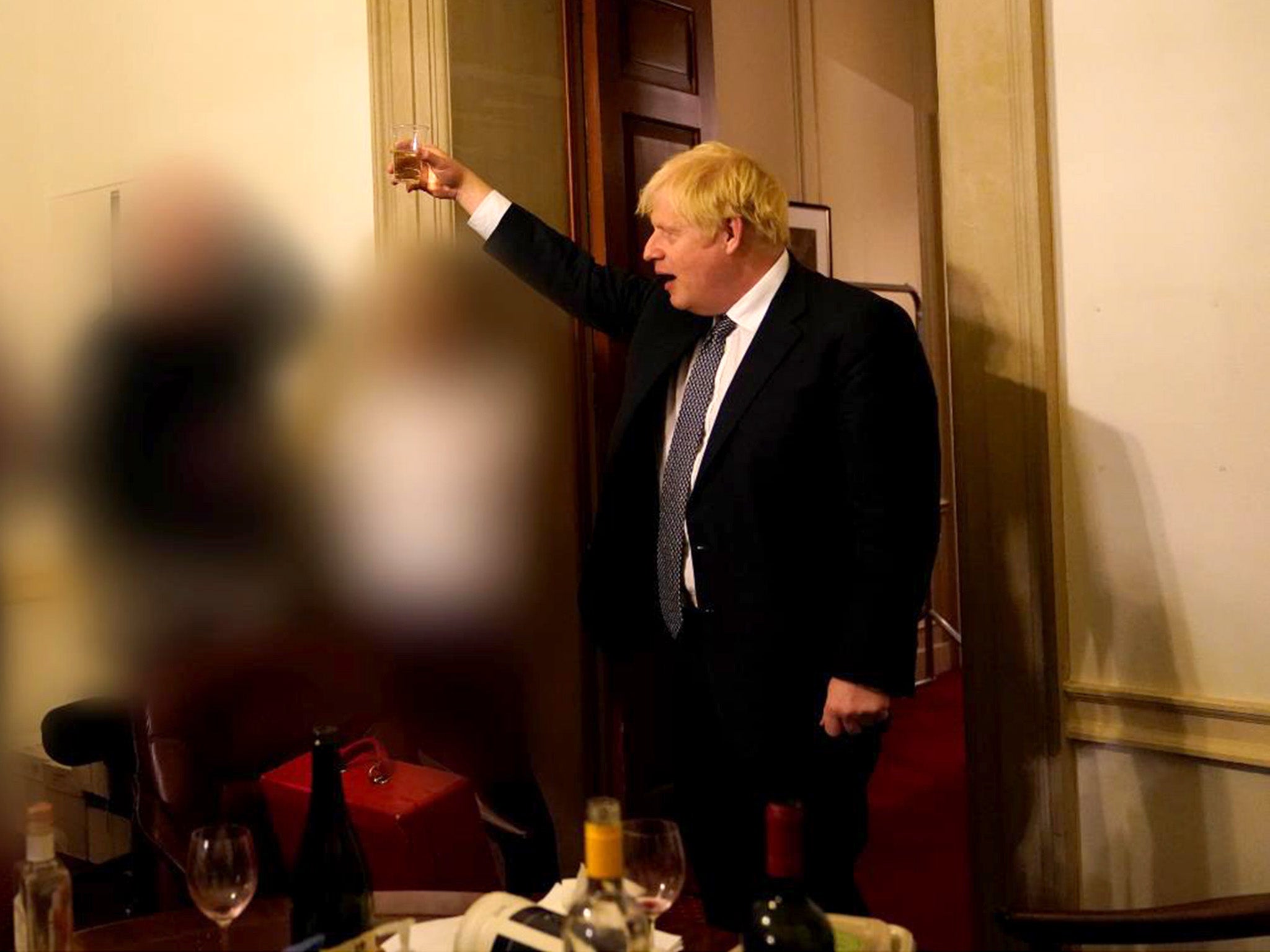
The reality is complicated. It probably never occurred to Downing Street staff that they might be breaking the law, but they obviously thought they were taking risks with the guidelines at times. There was also some mismatch between guidelines, law and common sense. In the intense atmosphere of crisis in No 10, people who came into the building to work were by definition operating under different rules from most of the population, who were locked down and working from home. As they were already in contact with each other, the distinction between gatherings for work and social purposes did not seem relevant. Common sense suggested that meeting outside was safe, hence the practice of holding some meetings on the garden terrace – as seen in the photo of Johnson, Carrie, Reynolds and Cummings that was published by The Guardian on 19 December 2021. The significant thing about that photo was the wine glasses, suggesting that the mixing of alcohol and work of which Gray so disapproved was an example set from the top.
The other factor was that so many of the people working in No 10 had had the virus – again an example set from the top. In the early days of the pandemic, having had the virus conferred some immunity and people assumed that they couldn’t get it again. As Professor Neil Ferguson, a member of the Scientific Advisory Group for Emergencies, said when he admitted breaking coronavirus rules, “I acted in the belief that I was immune.”
All these are explanations rather than excuses. Since the first story broke seven months ago, public opinion has hardened against the prime minister. He seems unable to escape the fundamental perception that he asked people to abide by rules he wasn’t prepared to follow himself. How much he knew of what was going on in the building in which he lived and worked is obscure. The test for the police in later issuing penalty notices was that the recipients “knew, or ought to have known, that what they were doing was an offence”. In the end, they decided that this test was met on 126 occasions by 83 people in and around Downing Street. Only one of those penalty notices was issued to the prime minister, and that was for an event that no one thought at the time might be a problem.
In many ways, Johnson is paying the price for people’s perceptions of him that were once his great strength: that he was an unconventional politician who would disrupt the establishment and deliver for the people. After a time lag, he is now seen as a rule-breaking politician who thinks, in the phrase that started to attach to him from the moment Cummings’s trip to Durham was reported, that there is one rule for him and a different rule for everyone else.






Join our commenting forum
Join thought-provoking conversations, follow other Independent readers and see their replies
Comments